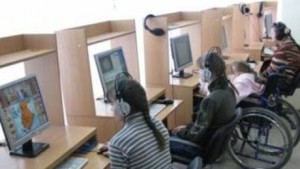 The Department for Higher and Postgraduate Education of the Ministry of Education and Science of Kazakhstan announced at an educational roundtable on March 13 that the government is assisting the education of nearly 500 students with physical challenges and is working to ease educational barriers for physically challenged students.
The Department for Higher and Postgraduate Education of the Ministry of Education and Science of Kazakhstan announced at an educational roundtable on March 13 that the government is assisting the education of nearly 500 students with physical challenges and is working to ease educational barriers for physically challenged students.
Overall, as announced at the roundtable by Minister of Education and Science Aslan Sarinzhipov, the ministry is developing a Concept of Inclusive Education, to be approved in 2014.
“More than 800 people are now studying at universities, among them 468 young people have been sponsored by the state. In 2012, the quota for persons with disabilities composed 0.5 percent of the total volume of state sponsorship and then it was increased up to 1 percent,” said Fatima Zhakypova, the department’s director.
Zhakypova also noted the government plans to reconfigure educational campuses to reduce barriers and increased mobility for physically challenged students.
“As of now, there are only two private universities (Kunayev University of Transport and Law and International Business Academy) and 178 colleges in Kazakhstan, which can offer barrier-free zones for students. Such universities as Pavlodar State University, Karaganda State University and Pedagogical State University of Taraz represent barrier-free zones, but partly. Right now, we are in the middle of the working process with three other universities, which will soon create appropriate conditions for students with disabilities to study there,” she explained.
The admission rules are also going to be changed to increase enrollment of physically challenged students, and professors will be offered training to better interact with physically challenged students.
Vocational and technical training programmes have also been established for the physically challenged, including painting and decorating, plastering, medicine and clothing manufacturing. The information technology degree remains one of the most popular degrees. This year, new curricular will be developed for another 10 educational programmes.
Zhakypova also reported that 80 percent of Kazakhstan graduates with disabilities are employed.
According to statistics, Kazakhstan has 138,513 children under 18 years old with physical disabilities, which equals 2.8 percent of the country’s child population.
Already, fifty-eight percent of Kazakhstan’s children with disabilities have gone on to finish high school and 9.1 percent have received a university diploma.

